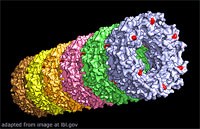New Academy of Science President Pledges Reforms

(Moscow Times – themoscowtimes.com – May 30, 2013) A nuclear physicist with ties to the business community is promising reforms after being elected as Russia’s second post-Soviet president to the Academy of Science.
Vladimir Fortov, 67, whose research has been used in the defense industry, received the majority of the votes cast by academics in Wednesday’s election, beating rival and Nobel Prize winner Zhores Alferov, who serves as a State Duma deputy with the Communist Party.
Fortov, a senior academy member, has been active in the business world, sitting on the technical council of the state technology corporation Rusnano and advising on the Skolkovo technological hub.
Fortov becomes the academy’s second president in post-Soviet Russia, replacing long-standing head Yury Osipov, who assumed the position in 1991.
Fortov promised to conduct reforms in the Academy of Science and to mend fences with Education and Science Minister Dmitry Livanov, who is at odds with academicians after calling bitingly the academy “ineffective.”
“I have known him for a while,” Fortov said of Livanov. “We have to start a dialogue and look for common points on which to communicate,” he said, according to RIA Novosti.
Among Fortov’s immediate proposed reforms is a reworking of the academy charter that would require a rotation of the academy’s presidency, restricting holders to two, five-year terms in office.
Founded in 1724, the Academy of Science was Russia’s and then the Soviet Union’s main scientific institution, producing fundamental research in mathematics and physics. The academy has more than 1,200 members.
Under the previous president, the academy’s image was tarnished after several members endorsed Viktor Petrik, who has been derided by other members as a “pseudo-scientist.” Among Petrik’s inventions is a filter that he claims can transform even heavily polluted water into pure drinking water.
